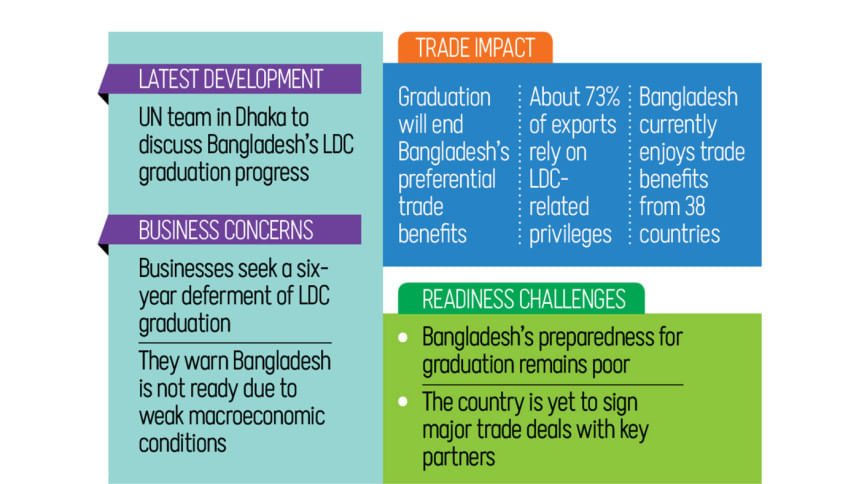Private sector seeks six-year delay to LDC graduation

Top business leaders yesterday urged a visiting United Nations (UN) delegation to recommend deferring Bangladesh's graduation from the least developed country (LDC) club by five to six years.They cited current macroeconomic stress, inflated growth data under the previous government, and poor overall preparedness for the transition.After hearing that the private sector is not ready yet, the high-level UN team asked for a detailed roadmap outlining the country's preparations for graduation. It sai...
Top business leaders yesterday urged a visiting United Nations (UN) delegation to recommend deferring Bangladesh's graduation from the least developed country (LDC) club by five to six years.
They cited current macroeconomic stress, inflated growth data under the previous government, and poor overall preparedness for the transition.
After hearing that the private sector is not ready yet, the high-level UN team asked for a detailed roadmap outlining the country's preparations for graduation. It said another delegation would visit Dhaka in January for a further assessment.
The country is currently scheduled to graduate from LDC status to a developing nation in November next year. Although the interim government has repeatedly said it intends to maintain that timeline, local businesses have urged authorities to seek an extension, pointing to inadequate readiness.
Amid this, the government invited the UN team, comprising both officials and independent experts, for a ground-level evaluation.
The team was led by Roland Mollerus, acting director of the United Nations Office of the High Representative for the Least Developed Countries, Landlocked Developing Countries and Small Island Developing States (UN-OHRLLS).
At a meeting held at the UN House in Dhaka yesterday, business leaders said they wanted the deferment because of mounting economic challenges, including high bank interest rates, years of loan scams and irregularities, and the fallout of the pandemic and the Russia-Ukraine war.
They alleged that the country's reported economic growth figures were "false, baseless and inflated", painting an inaccurate picture of Bangladesh's real condition to the international community.
They also claimed that under the previous government they had little opportunity to raise concerns.
Businesses told the delegation that Bangladesh has made limited progress in preparing for post-graduation challenges. The country has yet to sign major trade deals such as Free Trade Agreements (FTAs), Economic Partnership Agreements (EPAs) or Comprehensive Economic Partnership Agreements (CEPAs) with key trading partners -- which are essential to retain preferential market treatment after the graduation.
At present, Bangladesh enjoys LDC-related trade benefits in 38 countries, with 78 percent of its total exports linked to such preferences. So far, it has signed only one preferential trade agreement, with Bhutan.
Once the country graduates, it will also lose concessional loans from international lenders and donor countries, which trade leaders believe could undermine macroeconomic stability.
'NOT READY YET'
Md Zakir Hossain, secretary general of the Bangladesh Textile Mills Association (BTMA), who attended the meeting, said the UN delegation requested a detailed roadmap for LDC graduation preparedness.
"We did not request to stop the graduation process. We requested just a deferment for six years," Hossain told The Daily Star over the phone after the meeting.
Kamran T Rahman, president of the Metropolitan Chamber of Commerce and Industry (MCCI), said the business community believes Bangladesh will not be able to sustain the graduation if it proceeds.
"…six years have been sought for taking preparation as the country is not ready to sustain the challenges of the graduation right now," Rahman said, adding that the country's inadequate preparation is visible across several sectors, including logistics.
Mohammad Hatem, president of the Bangladesh Knitwear Manufacturers and Exporters Association (BKMEA), said the delegation has been briefed on the current economic, trade and industrial situation.
"The poor condition of the banking sector and the fall of exports indicate that the macroeconomic situation is not well now," he said.
He added that after graduation, Bangladesh would lose Generalised System of Preferences (GSP) benefits in markets such as the European Union, where exporters could face tariffs of 12.5 percent instead of the current zero-duty access.
Mahmud Hasan Khan, president of the Bangladesh Garment Manufacturers and Exporters Association (BGMEA), said the price of gas had risen by 286 percent between 2016 and 2023, while captive power costs increased by 40 percent, driving up production expenses amid an already strained economy.
He added that non-performing loans have risen to 27 percent, while bank interest rates stand at around 15 percent, further burdening manufacturers.
Khan expressed concern over ongoing political uncertainty, instability in global trade, declining orders ahead of the national election, and weak coordination in implementing the Smooth Transition Strategy (STS).
He said limited industrial diversification and heavy dependence on imported raw materials pose major risks to long-term economic stability.
Economist Mohammad Abdur Razzaque, chairman of local think tank Research and Policy Integration for Development (RAPID), who has been working with the UN team, said the delegation met Anisuzzaman Chowdhury, special assistant to the chief adviser, at the ERD office in Dhaka.
"The UN team has been listening about the situation now," said the economist.
Anwar-Ul-Alam Chowdhury (Parvez), president of the Bangladesh Chamber of Industries (BCI), said domestic industries should receive greater priority in the discussions. He advocated for a deferment, arguing that Bangladesh is not ready yet.
Leaders of the International Chamber of Commerce-Bangladesh, the Foreign Investors' Chambers of Commerce and Industry, the Leathergoods and Footwear Manufacturers and Exporters Association of Bangladesh (LFMEAB), and the Dhaka Chamber of Commerce and Industry also took part in the meeting.